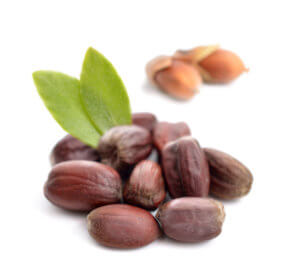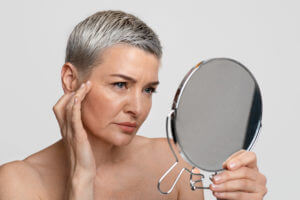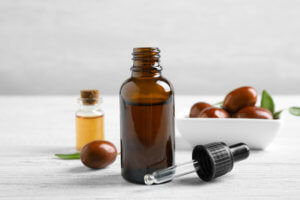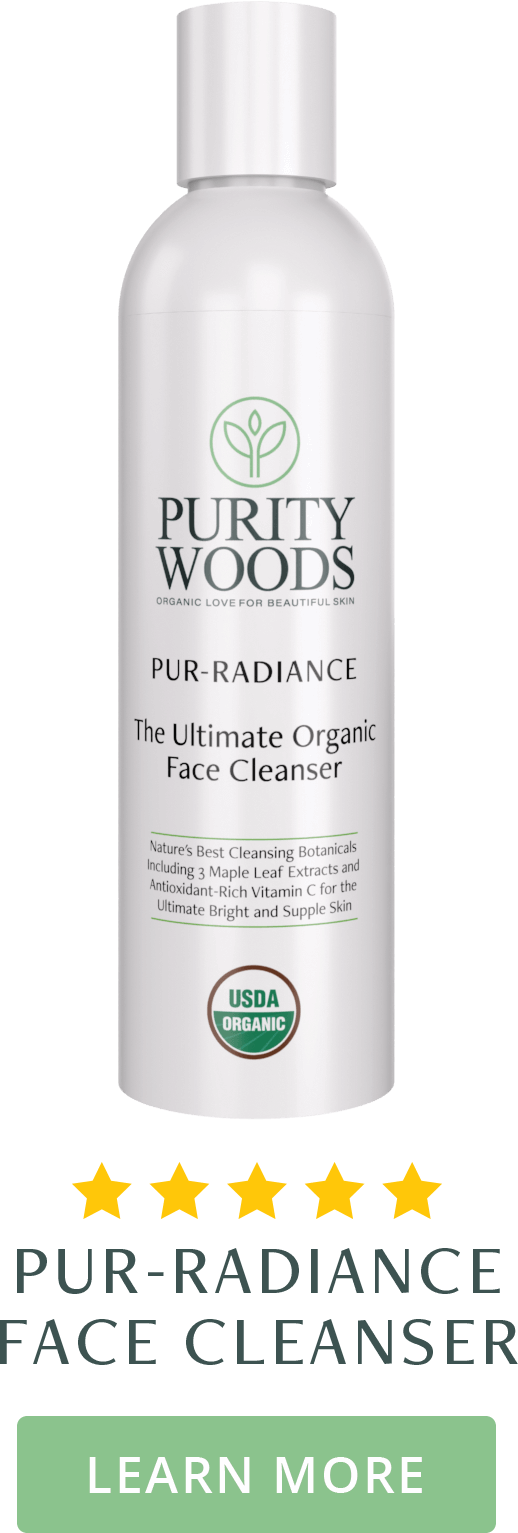The benefits of jojoba oil for your skin are very unique. It has a different makeup than any other plant-based oil and is outstanding for every type of skin. In fact, it isn’t a true oil at all, which is one of the reasons it can do things other oils can’t.
Dry skin, mature skin, acne-prone skin, normal skin— all can benefit from the properties of jojoba oil. It can be used alone or combined with other ingredients to boost its power and is very versatile.
Here’s a closer look at this highly popular skincare oil and how to make the most of it in your skincare routine.
What is Jojoba Oil?
Jojoba (pronounced ho-ho-ba) is a desert plant that goes by the botanical name of Simmondsia chinensis. It’s native to arid regions in North America, including northwestern Mexico, southern Arizona, and southern California.
Jojoba plants are perennials and thrive in dry, harsh conditions that most other plants would wither in. They have a shrub-like habitat and keep their leaves year-round.
Ironically, these shrubs that thrive in the desert end up producing a nourishing and moisturizing oil. The oil comes from the brown seeds or nuts of the plants, which are almost coffee-bean in shape, but larger. When pressed, an oily wax can be extracted from the seeds.
This liquid wax is what we know as jojoba oil, although it isn’t technically an oil at all. The correct term is a “wax ester”, but it functions so much like an oil that the name stuck.
However, you may want to keep the fact that jojoba is actually a wax at the back of your mind. This property is key to some of its unique benefits, including making it very similar to the sebum found in human skin.
A Long History for Skincare + Modern Use

Jojoba oil may be somewhat new in the modern skincare world, but it has been used for the skin for a long time.
Those who utilized jojoba the most were Native American tribes living where the plants grew natively. They were well aware of the benefits of jojoba oil for the skin and pressed their own oil by crushing the seeds. The oil was then used for sores, wounds, and damaged skin.
Eventually, the rest of the country began to learn about jojoba oil. It was prized because it was very shelf stable and could last for years without going rancid. This led to large commercial plantings of jojoba that expanded outside of the native areas of growth.
Today, jojoba oil is a popular ingredient in both skincare and hair care products. It has a light gold color in its pure form and a lightweight texture.
Top Benefits of Jojoba Oil for Skin
Deep, Yet Lightweight, Moisturizer
Jojoba oil has natural moisturizing properties like many other oils. Its unique makeup of wax esters and fatty acids allows it to be absorbed deeply into your skin, rather than just sitting on top. This allows it to hydrate, soften, and nourish the deeper layers of skin.
In technical terms, jojoba is considered a humectant, which means it helps to draw water to the top layer of your skin. It also has emollient properties, filling in around dry skin cells to make skin feel moisturized. On top of this, it helps to lock moisture in and keep it in your skin for longer.
Despite these excellent hydrating properties, jojoba oil doesn’t feel heavy or greasy. It closely resembles the sebum your own skin glands produce, so your skin feels right at home with it.
Helps Control Sebum Production

You’ve probably heard sebum mentioned a lot in connection with your skin, but what exactly is it?
Sebum is a very important substance that is produced by the sebaceous glands in your skin. Essentially, it’s an oily, waxy liquid that is made up of triglycerides, fatty acids, wax esters, squalene, and cholesterol. There are also smaller amounts of sugars and natural chemicals present.
The primary function of sebum is to form a protective barrier that prevents water loss. Some researchers believe it may also have an antimicrobial or antioxidant role.
Unfortunately, sebum production doesn’t always work like it should. If it gets under produced, you end up with dry and flaky skin. If it gets over produced, you may end up with oily skin, clogged pores, and breakouts.
One huge benefit to using jojoba oil on your skin is that it can help to even out sebum production. As mentioned before, it has a very similar composition to sebum and is “recognized” by your skin. This makes it balancing for both oily and dry skin types.
Friendly for Breakout-Prone Skin
Here’s some good news for acne sufferers: There are benefits of jojoba oil even for breakout-prone skin.
If you regularly deal with acne, you already know that not every oil is good for your skin. Some are heavy and pore-clogging and will only make breakouts worse.
Jojoba oil, however, has two main properties that make it acne friendly.
First, it closely mimics sebum (as we just went over). This makes it noncomedogenic (non pore-clogging) because your skin basically recognizes it as sebum.
It also means that applying it to your skin can actually make it less oily. This happens because your skin notices the presence of a sebum-like substance and therefore produces less of its own sebum. (And if you have dry skin + acne, jojoba acts as a non-comedogenic moisturizer.)
In addition, studies have found that jojoba oil has antimicrobial and anti-inflammatory properties that may help to calm breakouts and fight acne-causing bacteria.
Of course, jojoba oil is not going to act as an acne treatment on its own. However, you can use it knowing it won’t make breakouts worse.
Contains Anti-Aging Antioxidants

Along with hydration, jojoba oil also provides your skin with an antioxidant boost. It contains a range of antioxidants, including flavonoids and phenolic compounds, but is particularly rich in vitamin E.
Vitamin E is a fat soluble antioxidant vitamin that gives jojoba oil significant anti-aging benefits for skin. Like other antioxidants, it combats oxidative stress (also known as free radical damage) that contributes to the breakdown of skin proteins, cells, etc.
You may not know this, but the free radicals that cause oxidative stress are huge age-accelerators for your skin. They do damage to both collagen and elastin (two major anti-aging proteins) and also impair skin hydration. The result is visible signs of aging: wrinkles, saggy skin, under-eye bags, etc.
The best way to protect your skin from free radicals is by supplying it with antioxidants— like vitamin E. They effectively neutralize these damaging molecules, keeping your skin looking younger for longer.
Helps Protect Skin from Sun Damage
The vitamin E in jojoba oil helps to protect your skin from a very specific source of free radicals: UV damage.
As good as sunlight is for vitamin D production, too much of it is bad news for your skin. Damage from UV rays— known as photodamage— is one of the biggest generators of free radicals and signs of aging. It harms the deeper layers of your skin, leading to the formation of wrinkles, age spots, roughness, etc.
Antioxidants in general, typically offer your skin protection against this type of damage. Vitamin E, specifically, has been shown to protect against photodamage, particularly when applied topically.
Now, this doesn’t mean jojoba oil is a substitute for sunscreen. It isn’t known to have an SPF. But it can be an extra layer of protection for your skin if you tend to spend a lot of time in the sun, and may slow signs of aging.
May Boost Collagen Synthesis

Chances are good you’ve heard of collagen. It’s a very important protein that makes up about 70% of your skin and helps it to stay firm, thick, and wrinkle-free.
You may also have heard that collagen production starts declining in your body as you age. Part of this is due to the natural aging process, but collagen degradation also gets accelerated by free radicals and other toxins.
To make a long story short, boosting collagen production is key to rejuvenating your skin and fending off wrinkles and other signs of aging.
And the good news is that there may be collagen-boosting benefits of jojoba oil for your skin.
Some research has linked the topical application of antioxidants to enhanced collagen synthesis. Other studies, specifically on jojoba oil, have shown that it has the ability to speed wound healing by stimulating collagen synthesis.
More research is needed to discover just how much collagen-boosting power jojoba oil really has, but the results so far are promising!
Soothing for Irritated Skin
Jojoba oil has anti-inflammatory properties and helps to repair skin barrier function. This makes it very soothing for minor skin irritations and inflammation, and may be helpful for skin conditions like eczema or psoriasis.
In fact, applying jojoba oil to your skin is an excellent instant remedy for a sunburn. You can simply rub it on as is, add an essential oil like lavender, or combine it with aloe vera— another sunburn soother.
If you want a simple way to avoid razor burn, try ditching the shaving cream and using jojoba oil instead. Just put on a light layer of jojoba before shaving, and try applying a little afterwards to keep irritation from developing.
A final tip is to apply jojoba oil to cracked, irritated lips. Massage in a few drops, cover with a layer of lip balm, and you’ll be amazed at the results!
Aids Wound Healing and May Minimize Scarring

Preliminary studies have shown that there are benefits of jojoba oil for skin healing. It appears to stimulate collagen synthesis and also helps skin cells to bind back together after being separated by injury.
This gives it major potential for helping damaged skin to heal.
Your skin is constantly being exposed to stressors like wind, heat, and environmental toxins. Eventually, it starts struggling to repair itself, particularly if your skin is on the dry side. Using something like jojoba oil as an overnight “treatment” can really boost your skin’s ability to renew and heal itself.
Jojoba may also help to fade the appearance of scars. This isn’t proven in studies yet, but it does contain vitamin E, which has shown potential to reduce scarring.
To use it for this purpose, just massage a drop of the oil into the scar every evening.
Great for Healthy-Looking Hair
Your hair is directly connected to your skin via your scalp. This means that the health of your scalp/skin is tied to how healthy and vibrant your hair looks.
You probably won’t be surprised to learn that jojoba oil can be just as supportive for your hair as for your skin. Massaging a few drops into your scalp will help to relieve dryness. Adding a drop or two to your conditioner can also add shine, hydration, and softness to your hair.
In addition, jojoba oil is known to have antifungal properties. It hasn’t been tested/proven against dandruff yet, but many people do report dandruff relief when using jojoba on their scalp.
Choosing & Using the Best Jojoba Oil

When it comes to buying jojoba oil, look for a cold-pressed and unrefined option. This ensures that the maximum amount of beneficial compounds are kept intact post-harvest.
To truly get the maximum skin benefits from jojoba oil, you should also look for an organic version.
Buying USDA Certified Organic (or the equivalent in another country) ensures that your product is not contaminated with toxins from pesticides, chemical fertilizers, etc. It also means that no synthetic ingredients were added and it’s GMO-free.
When it comes to using jojoba oil, the options are nearly endless. You can apply it directly to your skin as often as needed or make use of it in a skincare product.
On its own, jojoba oil is a quick and effective makeup remover. It can also be applied to your cuticles to moisturize them or to any area of skin for that matter. You can even use it as a lightweight, non-greasy oil for cleansing your face.
Anti-Aging Facial Cleanser with Jojoba Oil
If you are interested in a natural facial cleanser that will make your skin look younger, look into the Pur-Radiance Face Cleanser from Purity Woods.
This USDA Organic cleanser is formulated with the top botanical ingredients to gently and effectively cleanse skin. It contains maple leaf extracts to help skin look younger and firmer as well as soothing ingredients like aloe vera and chamomile extract to calm and brighten skin.
Of course, one of the “secret” ingredients in this cleanser is organic jojoba oil. Jojoba helps keep your skin from drying out and prevents it from being stripped of its precious natural oils. It also soothes skin and balances sebum production.
Learn more about the Pur-Radiance Face Cleanser here, and add this incredible “oil” to your daily skincare routine!




